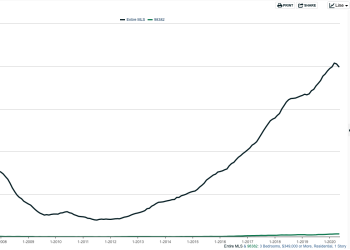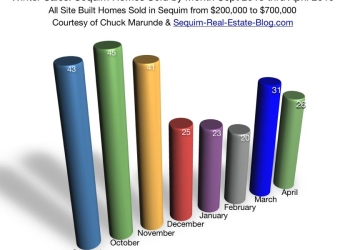Homes sales were up in November nationally, but it turns out the NAR (National Association of Realtors) overstated national homes sales by three million from 2007 through 2010. That means the national real estate market was worse than reported. NAR revised homes sales downward by 11% for 2007, 16% for 2008, 16% for 2009, and 15% for 2010. What does this mean? Not much for the individual home buyer. The NAR data is used by building industry officials and large builders and associated businesses within the building industry, but for the individual buyer, it only tells us it was worse than the NAR thought.
Home Sales Overstated No Suprise
How could t he NAR issue reports with home sales overstated? The NAR collects its data from multiple listing services around the country. That sounds simple enough, but the MLSs around the country consist of multiple companies, some are privately owned and some are owned by real estate associations. They do not all use the same data systems, and the have different ways of assembling and report information from their databases. In addition, MLSs often overlap geographic areas, so a listing might show up in more than one MLS and would result in multiple sales for one sale. The NAR also does not collect sales data on all homes. Not all MLS data is fed to the NAR database, nor are all sales posted in an MLS. Only about 40% of all home sales are reported to the NAR. That’s how we ended up with home sales overstated.
he NAR issue reports with home sales overstated? The NAR collects its data from multiple listing services around the country. That sounds simple enough, but the MLSs around the country consist of multiple companies, some are privately owned and some are owned by real estate associations. They do not all use the same data systems, and the have different ways of assembling and report information from their databases. In addition, MLSs often overlap geographic areas, so a listing might show up in more than one MLS and would result in multiple sales for one sale. The NAR also does not collect sales data on all homes. Not all MLS data is fed to the NAR database, nor are all sales posted in an MLS. Only about 40% of all home sales are reported to the NAR. That’s how we ended up with home sales overstated.
Home Sales Projections
I written elsewhere that one should not put much stock into government or association reported statistics. Too often the statistics are either skewed, wrong, or incomplete. While home sales are reported to be up last month, and that is encouraging, it doesn’t really mean anything to a retiree buying a home in Sequim, Washington.
Sam Chandon of the Wharton School of Business said that the majority of net new buyers in the coming months and years will be young couples, and the main issue right now for young couples is whether they have jobs that provide sufficient income and whether they feel secure enough in that job to buy a house. In the Sequim area, we have very few buyers in that category. The vast majority of buyers for homes and land in Sequim are retirees. Sequim is fortunate that what happens on a national level has less impact on the Sequim real estate market than 90% of the rest of the country. We are effected by retirees who cannot sell their homes elsewhere, if they have to sell before they can buy a home in Sequim. But many retirees are buying homes in Sequim without having to first sell their other home.
Home sales in the Sequim will large be impacted not by young couples, but by retirees who are the majority of qualified buyers in Sequim.

































